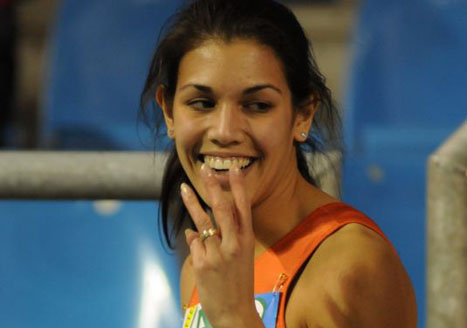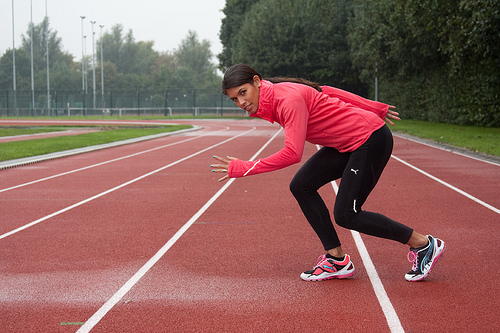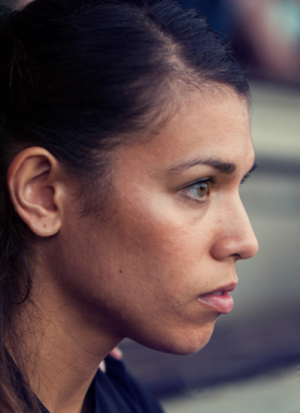Pursuit: Sprinter, Vitality Coach, Rio 2016 Hopeful!
Definition of success: “if you know that you’ve done everything within your own power to reach a goal you set, you’re already successful.”
I think it started in Beijing for me. Or possibly Athens.
I told my family: ‘We’re going to the next Olympics.’ But 2008 rolled by and the closest to the action we got was a few metres from the TV screen in our living room. So I made up my mind that we’d attend in 2012 which, given that the Olympic Park was within an hour of my house, perhaps wasn’t overly ambitious. In the end we watched the archery live, but failed to acquire athletics tickets – which were like hen’s teeth.
So before I know where the years have gone, suddenly we’re looking at 2016 and the carnival town that is Rio de Janeiro.
Brazil.
That’s 5790 miles from my front door. I mean, that is going to take some serious budget management over the next few months. Because there’re the travel expenses, the accommodation, food and drink, and that’s before I’ve even thought about event tickets. Which, if London was anything to go by, may or may not be obtainable anyway.
South America though…Half way round the world and across the equator. It’s enticing.
And if it’s enticing to me, it’s certainly enticing to Dutch sprinter Esther Akihary, who like all those who provide the very spectacle of the Olympic Games must earn her place in the national team.
And I’m pleased to say that Esther’s #RoadtoRio – yes that’s a hashtag we’re going to see a lot of in the coming months – is something I’ll be covering as she races for her seat on the plane to Brazil. I’ll be following Esther on her path towards qualification, the inevitable tension, the ups and the downs. The sweat and lactic acid are all hers, but the emotion, I hope, is something that we’ll all partake of.
Before we take our first steps in the series though, I’d like to begin by getting to know Esther, our subject, the one who goes forward and sacrifices everything she’s got to make her place on the team.
And what better place to start than at the beginning?
“My father inspired me to start running,” Esther obliges, “because he went jogging all the time. When I was old enough to ride a bicycle I always went with him to take his bottle of water and a towel. I first started running on the track when I was nine years old. The village I lived in held a school race on the track. I ended somewhere between number one and the last runner, but I had fun! After that day I became a member of the local athletics team.”
And that, I suppose, was the start of Esther’s journey. Perhaps what we’re doing is tantamount to jumping aboard an already moving train. But then, an athlete’s career starts anew each season. Just because she was at London in 2012 doesn’t mean Esther is guaranteed a spot in Rio. She has the capabilities, certainly, but it’s a berth that won’t come without a fight. At least we have in our midsts a worthy contender for whom sport is life…or life is sport; I’m not sure which way round it is actually.
“Being a professional athlete means I devote twenty-four-seven to my sports. Even the hours I sleep are planned. But because being an athlete isn’t a goldmine I do have to work to pay the bills. Work is about thirty hours per week, and the rest is devoted to sports, from which twenty-five hours are actual physical activity on the track and in the gym.”
And on that note, I thought it might be interesting to see what the daily agenda of an Olympian looks like, so I asked Esther for a schedule:
“
6.00 a.m. Wake up, take a shower, have breakfast and go to work by bike
7.00 a.m. I give my first session of personal training. (I’m a vitality coach, so I give PT, courses about food, mindset and physical activity etc.)
1.00 p.m. Go home, have lunch
2.00 p.m. Have a siesta
4.00 p.m. Wake up with some happy music, so I start to feel awake again
4.30 p.m. Eat a light meal, like a banana-egg pancake and some vegetables
5.00 p.m. Answer some e-mails for work, or make schedules for my clients
5.50 p.m. Go to the track by bike, which is a ten minute ride, and then do my own exercises, like stretching and/or core stability
6.30 p.m. Start of practice on the track
8.15 p.m. Go to the gym next to the track for weightlifting
9.30 p.m. End of practice, cycle home
10.00 p.m. Have a shower and eat some quark
10.30-11.00 p.m. Bedtime
”
“Everyday is different,” she adds, “but there is consistency each week.”
Three and a half hours of training every day and six hours spent administering training to others. As you can see, Esther’s commitments are a juggling act. A precisely engineered one, but a challenging one nonetheless. I wonder if, given that Esther leads a double life of competitive sport and entrepreneurship, she doesn’t envy the ones pursuing a ‘normal’ job.
“No,” she avers, “it’s more the other way around. I sometimes envy the athletes who don’t have to work next to their professional sports career to pay the bills. The ones that can fully focus on sports. That would be my dream career.”
The more Esther says, the more it starts to sink in. Hers is the very definition of commitment.
I like to stay fit. I run a couple of times a week, lift weights every other day. Compared to Esther’s athletic prowess though I’m on another planet. In fact, if I’m completely honest, I’m in a galaxy far, far away, with no hope of getting back. Partly that’s got to do with my forties, which lie just a couple of years before me on a rapidly approaching horizon. Principally though I don’t have time to get in better shape than I’m in now. I mean, I have financial commitments, right?
But that’s just it. So does Esther. And on the Road to Rio we could look at sprinters like Shelly-Ann Fraser-Pryce and Allyson Felix, who with their lucrative sponsorship deals and advertising contracts are able to devote far more of their waking hours to training, but that’s a different kind of commitment. Not an easier one, nobody’s saying that, but a more straightforward and focused one. They might face the same risk of injury, the same occasional disinclination to hit the track day after day, but they don’t have to worry about where the money’s coming from. And financial freedom, I can but imagine, must be wonderful for the soul.
Even so, with her sporting commitments so put upon, Esther has carved out some impressive highlights
“Individual, it’s my P.B. in the 100 meters: 11.59 in Liege on the 5th of July in 2012. Being part of the relay team it’s the silver medal at the European Championships and participation in the Olympics, both in 2012.”
We’re looking at an athlete who holds down a day job, and somehow manages to clock a 100m time just 0.7 seconds shy of the aforementioned Miss Felix, whose website footer is replete with the logos of Nike, Gatorade, Visa and AT&T to name but a few.
There’s a common theme though among all athletes, and that is this: despite the very tangible goals they set themselves, always measured in increments of time and precious metal, they without exception tend to measure success as a journey. 400m star Christine Ohuruogu told me success is “the culmination of good planning, good focus and good drive.” She didn’t say anything about her Olympic gold medal or the national record. And when I ask Esther the same question, her idea of success likewise reflects the fulfilment of potential over any solid target.
“I think that is a hard question to answer, but I think that if you know that you’ve done everything within your own power to reach a goal you set, you’re already successful. So that said, it means you need to set a goal first of all and secondly work hard for it. Meaning you do everything within your own abilities to succeed, because some outcomes depend on factors that are not in your power. And last, but definitely not least: do it with passion.”
Put simply: do your best.
And, of course, do the thing you love.
“First of all it is wonderful that someone has a clear goal!” Esther says when I ask what advice she would give to someone about to embark on their own endeavors. “The most important thing is that you have passion and work hard to reach that goal. Without passion it’s just hard work and without hard work a goal becomes a dream. So set your goals, work very hard and do it with passion. Feel the energy that passion gives you!”
My thanks to Esther for what I hope will be the beginning of a fulfilling journey on the #RoadtoRio 2016. Stay tuned as we follow her through competitions, training and all the tests that go hand in hand with qualification for the greatest event in the sporting calendar.
You can also keep up by following Esther on Twitter @EstherAkihary and on her website www.estherakihary.com, which has all the information on Esther both as a competitive athlete and as a personal trainer and vitality coach.






3 Comments
Sally Cronin
This should keep you fit Matt.. it will be a fascinating insight into how much committment and dedication is required to reach that prized place in the Olympics..
Matt Kruze
Wow, do you really think just by covering this I’ll get fit? Here’s hoping!
Thanks Sally, I’m looking forward to finding out too.
google advertising professional
Thanks for sharing your thoughts on esther akihary.
Regards